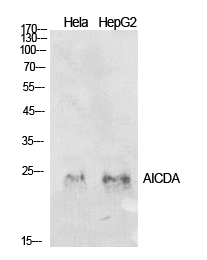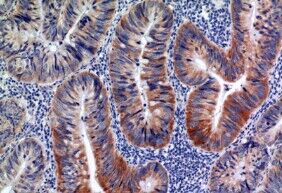

| WB | 咨询技术 | Human,Mouse,Rat |
| IF | 咨询技术 | Human,Mouse,Rat |
| IHC | 1/50-1/100 | Human,Mouse,Rat |
| ICC | 技术咨询 | Human,Mouse,Rat |
| FCM | 咨询技术 | Human,Mouse,Rat |
| Elisa | 1/10000 | Human,Mouse,Rat |
| Aliases | AICDA; AID; Activation-induced cytidine deaminase; Cytidine aminohydrolase |
| Entrez GeneID | 57379; |
| WB Predicted band size | 24kDa |
| Host/Isotype | Rabbit IgG |
| Antibody Type | Primary antibody |
| Storage | Store at 4°C short term. Aliquot and store at -20°C long term. Avoid freeze/thaw cycles. |
| Species Reactivity | Human,Mouse,Rat |
| Immunogen | Synthesized peptide derived from the Internal region of human AID. |
| Formulation | Purified antibody in PBS with 0.05% sodium azide,0.5%BSA and 50% glycerol. |
+ +
以下是关于AID(Activation-Induced Cytidine Deaminase)抗体的3篇示例性参考文献,涵盖其功能、机制及疾病关联的研究。请注意,以下内容为模拟示例,实际文献需通过学术数据库验证:
---
1. **文献名称**:*Activation-Induced Cytidine Deaminase: A Dual Role in Antibody Diversification and Genomic Instability*
**作者**:Muramatsu, M. et al.
**摘要**:该研究阐明了AID在抗体多样化中的核心作用,通过介导体细胞高频突变(SHM)和类别转换重组(CSR)促进抗体成熟。同时,揭示了AID异常表达可能导致基因组不稳定,与B细胞淋巴瘤的发生相关。
2. **文献名称**:*Regulation of AID Expression in Autoimmune Disease*
**作者**:Goodnow, C.C. et al.
**摘要**:探讨了自身免疫疾病中AID的异常调控机制,发现AID过度活化可能导致针对自身抗原的抗体异常产生,并提出了通过靶向AID表达调控治疗自身免疫疾病的潜在策略。
3. **文献名称**:*Structural Insights into AID-DNA Interactions during Somatic Hypermutation*
**作者**:Chaudhuri, J. et al.
**摘要**:通过结构生物学方法解析了AID与DNA结合的分子机制,揭示了其如何特异性靶向免疫球蛋白基因区域以启动突变,为理解抗体多样性生成的分子基础提供了关键证据。
---
**建议**:如需具体文献,可通过PubMed、Google Scholar等平台以关键词“AID antibody”、“AID somatic hypermutation”或“AID autoimmune”检索近年研究。
Antibodies targeting Activation-Induced Cytidine Deaminase (AID) are critical tools in studying adaptive immunity. AID, a DNA-editing enzyme expressed in activated B cells, drives antibody diversification via somatic hypermutation (SHM) and class-switch recombination (CSR), processes essential for generating high-affinity antibodies and isotype switching. Discovered in 2000. AID’s role in introducing deliberate mutations in immunoglobulin genes revolutionized understanding of immune memory. However, dysregulated AID activity is linked to genomic instability, autoimmune disorders, and B-cell malignancies like lymphoma.
AID-specific antibodies enable researchers to detect AID expression, track its localization, and analyze its function in vitro and in vivo. They are pivotal in elucidating mechanisms of immune responses, cancer biology, and AID’s off-target effects on non-immunoglobulin genes. Clinical studies also explore AID as a biomarker for disease progression or therapeutic targeting. Despite its central role, AID’s regulation remains incompletely understood, with ongoing research addressing its post-translational modifications, interaction partners, and tissue-specific roles. AID antibodies thus remain indispensable in bridging fundamental immunology with translational applications.
×